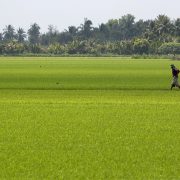The Stream, October 19: Drought Unleashes Red Tide in Texas Gulf
The largest red tide algae bloom since 2000 is gripping the Texas Gulf Coast, the Associated Press reported. The prolonged Texas drought this year kept freshwater from reaching the Gulf, raising the salinity levels in which the algae thrive.
Despite record-breaking rainfall in October, 99 percent of Texas remains under severe drought conditions, Think Progress reported.
Meanwhile, ninety-two people have died in Mexico and Central America amid heavy rains, mudslides and flooding.
Rivers and streams release carbon dioxide into the atmosphere, adding a new variable to climate change modeling, UPI reported, citing a new study by Yale University.
About 12 million hectares of arable land are lost every year due to degradation, the Guardian reported. This article looks at the global effects of desertification, and how the process can be stopped through sustainable water and soil management.
Japan is considering stopping its entire nuclear energy program in the wake of the Fukushima disaster, AlertNet reported. And The New Yorker looks at Japan’s nuclear predicament seven months after the Fukushima accident.
Deforestation from Uganda’s government-backed sugar industry threatens the Mabira Forest Reserve, AlterNet reported.
The Stream is a daily digest spotting global water trends. To get more water news, follow Circle of Blue on Twitter and sign up for our newsletter.
A news correspondent for Circle of Blue based out of Hawaii. She writes The Stream, Circle of Blue’s daily digest of international water news trends. Her interests include food security, ecology and the Great Lakes.
Contact Codi Kozacek






Leave a Reply
Want to join the discussion?Feel free to contribute!